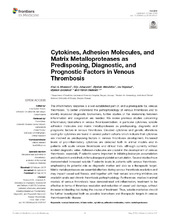| dc.contributor.author | Mosevoll, Knut Anders | en_US |
| dc.contributor.author | Johansen, Silje | en_US |
| dc.contributor.author | Wendelbo, Øystein | en_US |
| dc.contributor.author | Nepstad, Ina | en_US |
| dc.contributor.author | Bruserud, Øystein | en_US |
| dc.contributor.author | Reikvam, Håkon | en_US |
| dc.date.accessioned | 2019-06-13T16:08:02Z | |
| dc.date.available | 2019-06-13T16:08:02Z | |
| dc.date.issued | 2018-05-22 | |
| dc.Published | Mosevoll KA, Johansen S, Wendelbo Ø, Nepstad I, Bruserud Ø, Reikvam H. Cytokines, adhesion molecules, and matrix metalloproteases as predisposing, diagnostic, and prognostic factors in venous thrombosis. Frontiers in medicine. 2018;5:147 | eng |
| dc.identifier.issn | 2296-858X | |
| dc.identifier.uri | https://hdl.handle.net/1956/20004 | |
| dc.description.abstract | The inflammatory response is a well-established part of, and a prerequisite for, venous thrombosis. To better understand the pathophysiology of venous thrombosis and to identify improved diagnostic biomarkers, further studies of the relationship between inflammation and coagulation are needed. We review previous studies concerning inflammatory biomarkers in venous thromboembolism, in particular cytokines, soluble adhesion molecules and matrix metalloproteases as predisposing, diagnostic and prognostic factors in venous thrombosis. Elevated cytokines and genetic alterations coding for cytokines are found in several patient cohorts which indicate that cytokines are involved as predisposing factors in venous thrombosis development. Increased levels of pro-inflammatory cytokines are detected both in animal models and in patients with acute venous thrombosis and clinical trials, although currently without evident diagnostic value. Adhesion molecules are crucial in the development of venous thrombosis, especially P-selectin seems important in initiating leukocyte accumulation and adhesion to endothelium for subsequent platelet accumulation. Several studies have demonstrated increased soluble P-selectin levels in patients with venous thrombosis, emphasizing its potential role as diagnostic marker and also as a therapeutic target. Matrix metalloproteases are essential effectors during venous thrombosis resolution and may impact vessel wall fibrosis, and together with their natural occurring inhibitors are crucial in acute and chronic thrombosis pathophysiology. Furthermore, studies in animal models of venous thrombosis have demonstrated anti-inflammatory treatment to be effective in terms of thrombus resolution and reduction of vessel wall damage, without increase in bleeding risk during the course of treatment. Thus, soluble mediators should be further investigated both as possible biomarkers and therapeutic targets in venous thromboembolic disease. | en_US |
| dc.language.iso | eng | eng |
| dc.publisher | Frontiers Media | eng |
| dc.rights | Attribution CC BY | eng |
| dc.rights.uri | http://creativecommons.org/licenses/by/4.0/ | eng |
| dc.subject | venous thrombosis | eng |
| dc.subject | Inflammation | eng |
| dc.subject | Cytokines | eng |
| dc.subject | adhesion molecules | eng |
| dc.subject | matrix metalloproteases | eng |
| dc.title | Cytokines, adhesion molecules, and matrix metalloproteases as predisposing, diagnostic, and prognostic factors in venous thrombosis | en_US |
| dc.type | Peer reviewed | |
| dc.type | Journal article | |
| dc.date.updated | 2019-01-30T14:17:17Z | |
| dc.description.version | publishedVersion | en_US |
| dc.rights.holder | Copyright 2018 The Authors | |
| dc.identifier.doi | https://doi.org/10.3389/fmed.2018.00147 | |
| dc.identifier.cristin | 1602881 | |
| dc.source.journal | Frontiers in medicine | |

